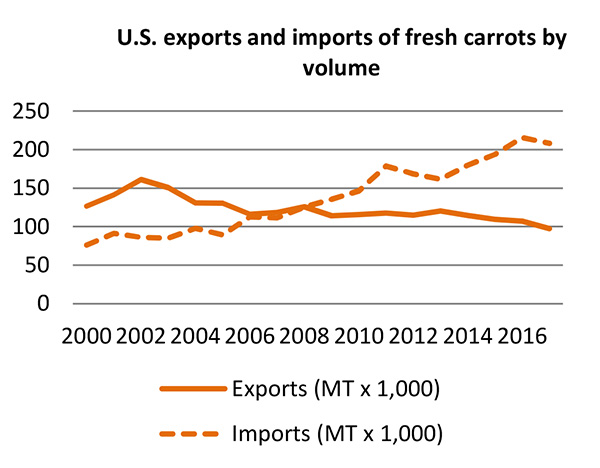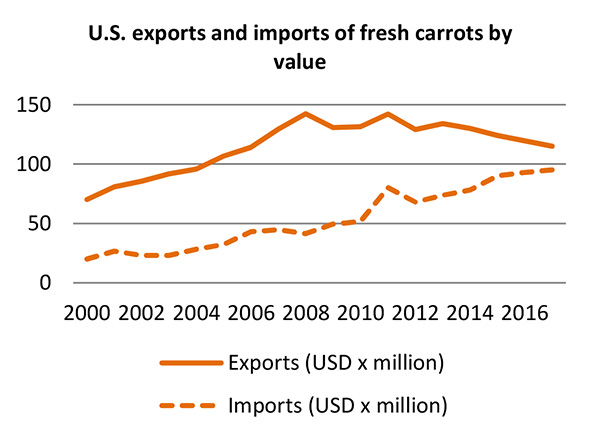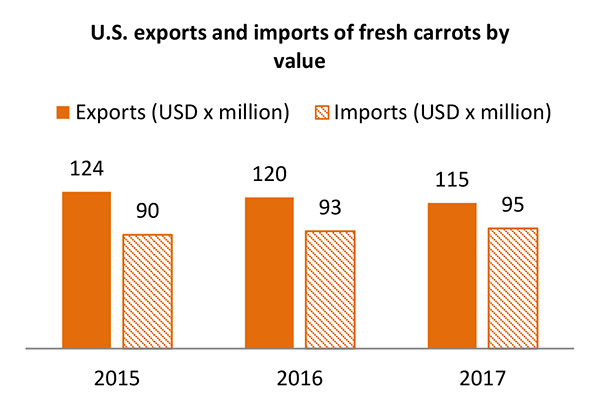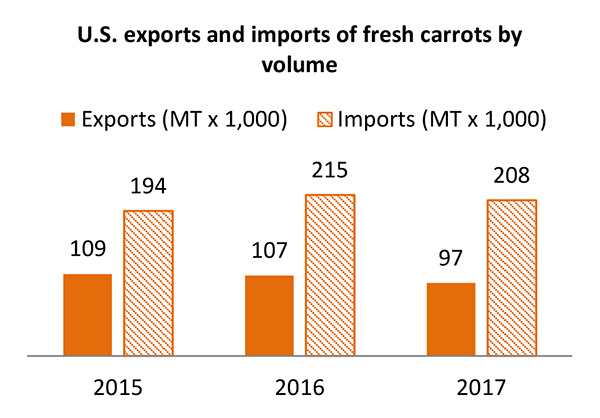By Mark Wocial, Certified Global Business Professional, Wocial & Associates LLC
U.S. exports and imports of fresh carrots exhibited opposite trends in the past several years, with exports declining and imports increasing. Last year, U.S. exports decreased to 97,000 metric tons (MT), while imports reached 208,000 MT. However, despite a much lower volume, carrot exports were valued at $115 million while imports were valued at $95 million. This was the result of a very significant difference in the value per ton. On average, exports were valued at $1,185/MT while imports were valued at $457/MT.
Exports
The exports statistics collected by the U.S. Census Bureau Foreign Trade Division make a distinction between not-certified-organic and certified-organic fresh or chilled carrots. No such distinction exists for the import statistics. While exports of non-organic carrots declined in the past three years, exports of certified organic carrots showed increases. The latter increased from 20,579 MT in 2015, valued at $27.8 million, to 22,530 MT in 2017, valued at $34.8 million. Last year, exports of certified organic carrots were valued at $1,544/MT compared to $1,072/MT for non-organic carrots.
Canada is by far the largest export market for fresh carrots. Last year, exports of non-organic carrots to Canada accounted for 94 percent of all carrot exports. However, shipments to Canada declined from almost 81,000 MT ($85.8 million) in 2015 to 70,000 MT ($75.8 million) in 2017. Exports to Mexico also exhibited declines, from 4,127 MT ($3.3 million) in 2015 to 3,271 MT ($2.9 million) in 2017. Last year, St. Lucia was the third largest export market for non-organic fresh carrots, with shipments of 324 MT to the island, valued at $0.3 million. Together with other Caribbean islands, U.S. exports to the region last year totaled at 710 MT ($0.7 million). Other export markets included Singapore (154 MT), Hong Kong (57 MT), South Korea (73 MT), Malaysia (68 MT) and France (61 MT).
Canada is also the largest export market for organic fresh carrots. Last year, shipments of organic carrots to Canada amounted to 18,300 MT, valued at $25.3 million. Exports of organic carrots to France and Brazil showed strong increases in the past three years. Shipments to France increased from 153 MT ($0.7 million) in 2015 to 527 MT ($2.4 million) in 2017. In the same period, shipments to Brazil increased from 258 MT ($0.8 million) to 487 MT ($2.3 million). Although exports of organic carrots to Mexico last year amounted to 2,000 MT, their value was only $1.8 million. Exports to the Netherlands also showed strong increases and grew from 27 MT ($0.2 million) in 2015 to 145 MT ($0.9 million) in 2017.
Organic carrots were also exported last year to several other countries. In the Middle East, the U.A.E. was the largest market (467 MT), followed by Jordan (149 MT) and Saudi Arabia (38 MT). In Asia, last year organic carrots were shipped to Hong Kong (68 MT), Malaysia (18 MT), Taiwan (14 MT) and Japan (2.9 MT).
Imports
In 2017, 47 percent of imported fresh carrots came from Canada. Those imports amounted to 96,500 MT, valued at $48.8 million. Fresh carrots from Mexico accounted for 43 percent of imports (89,000 MT, valued at $34.5 million). In the last few years, Israel was the third largest supplier of fresh carrots to the U.S. Imports from Israel increased from 8,900 MT ($3.5 million) in 2013 to 19,200 MT ($6.4 million) in 2017. Imports from Guatemala also showed steady increases, from 855 MT ($1.4 million) in 2014 to 2,600 MT ($5.0 million) in 2017. In contrast, imports from Costa Rica showed an opposite trend and declined steadily from 2,300 MT in 2013 to 600 MT last year.
This information is based on the author’s analysis of the export and import trade data collected by the U.S. Census Bureau Foreign Trade Division.
About the Author: Mark Wocial is a Certified Global Business Professional and a member of NASBITE International, a professional organization dedicated to advancing global commerce through education and training. He is an independent international trade specialist focused on the food and agribusiness sector. He can be reached at mwocial@wocialassociates.com or (317) 362-6906.





